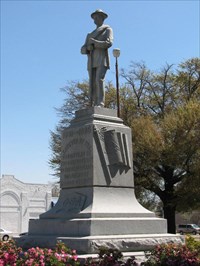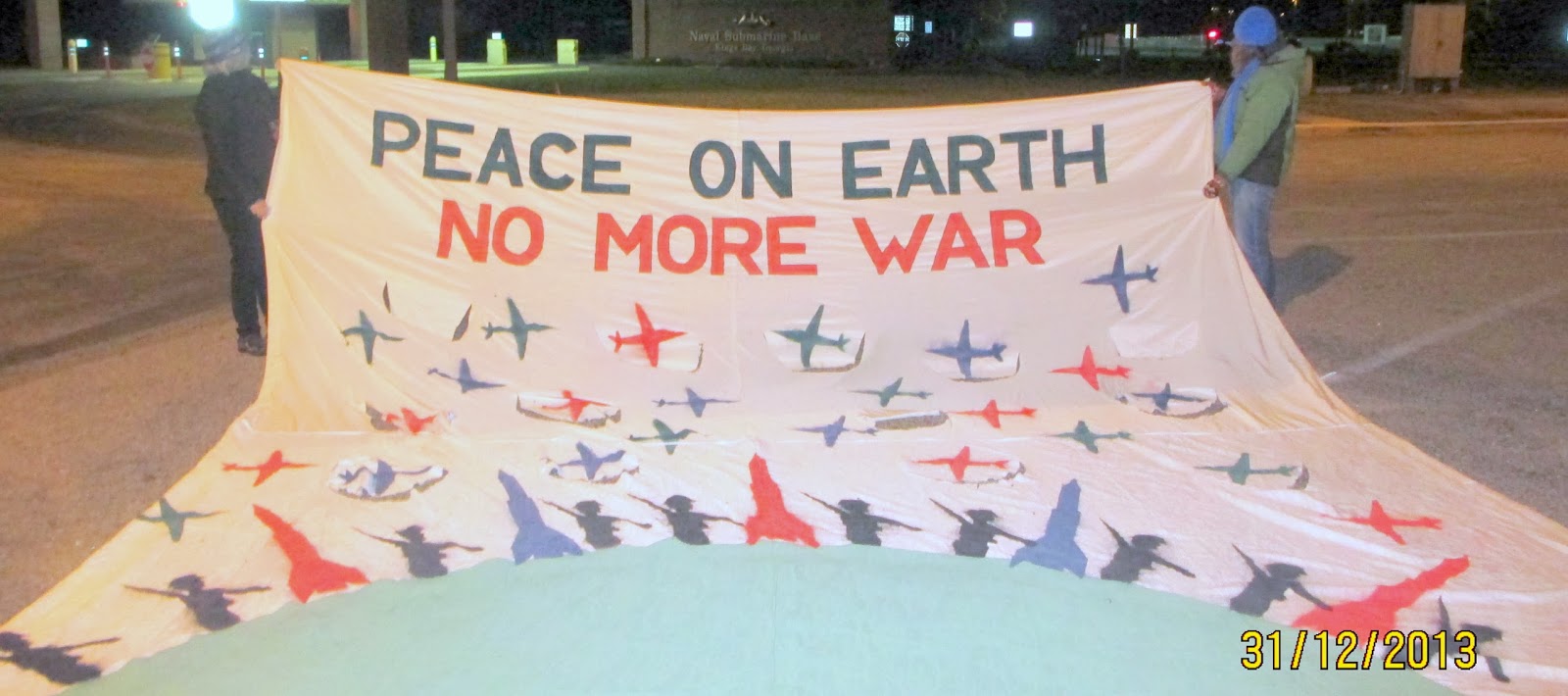 |
| Students gather in Tuskegee for "War on Earth" Presentation |
Tuskegee, Alabama - January, 2014
We took our traveling Power Point Presentation on Militarism’s Environmental Impact in the South to Tuskegee, Alabama, on the Martin Luther King, Jr. holiday. We were warmly welcomed by community members, students and faculty from the historic Tuskegee University.
We enjoyed an insiders’ tour with Tuskegee University Alumna Norma Jackson, active with the Alabama New South Coalition. We met with Mujah Shakir, a Professor at Tuskegee and faculty adviser for the Black Belt Deliberative Dialog Group whose focus is to "foster and encourage thinking and acting on important issues that are of past, present and future interest to area residents." One project involved meeting and interviewing surviving family members of those harmed by the infamous Tuskegee Syphilis Experiment, a study of untreated syphilis in black males — primarily from Macon County — that was finally made public and ended in 1972.
.
We also met Attorney Lateefah Muhammad, who has thrown her hat in the ring for District Court Judge in Macon County. These women are powerful voices for justice and change.Tuskegee is a point of light and sacred ground in the constellation of hard fought battles to undo the structural racism of Southern Apartheid. The struggles are ongoing.
 |
| Lateefah, Clare, Mujah and Norma in Tuskegee |
The sprawling, now gated campus, founded as Tuskegee Institute by Booker T. Washington in 1881, is situated in Macon County, part of Alabama’s predominantly African-American Black Belt region, so-called because of the abundant rich and fertile black soil, the legacy of slavery with the plantation agriculture system of the 19th century, and the remarkable 20th century Civil Rights revolution. The region is rich with Southern cultural history, yet in this 21st century, Alabama’s Black Belt continues to struggle with economic depression and dire socioeconomic conditions.
 |
| Confederate Soldier in Tuskegee |
Civil Rights legend,102 year old Amelia Boynton Robinson, a lead organizer and participant in the Selma Voting Rights Movement, also makes her home in Tuskegee.
 |
| Mrs. Amelia Boynton Robinson |
In our presentations throughout the South we always encourage our audience to interrupt us with questions and add any personal insights brought forth by the material – and this crowd did just that.
You mean we keep a U.S. stockpile of the same chemical weapons that we object to in Syria? One student asked. Yes, we do.
What college funding sources are available other than through ROTC and early enlistment programs? Another student wanted to know.A good question, but one we did not have an easy answer for. Students everywhere face the prospect of long-term and crippling debt in pursuit of an education.
When we highlighted the Marine Corps’ 30-year cover up of contamination of Marine family housing drinking water, at Camp Lejeune, N.C. a young Tuskegee Airman, home for a break, said, “… my Sergeant recommends we use bottled water and not drink from the base’s water supply.”
This young airman is fortunate to have a sergeant who took it upon himself to inform the men and women under his command. The U.S. military has no legal obligation to inform soldiers if a base where they are stationed is on an EPA Superfund site, or otherwise contaminated. The burden has long been left with service personnel and their families to uncover the information.
| TVA Coal Ash Kills |
Though the Confederate soldier's statue still stands in Tuskegee, there is yet no monument in the town square for Sammy Younge, a 22 year old Navy veteran and Tuskegee student shot to death in 1966 as he attempted to use a “Whites Only” bathroom at a Standard Oil gas station. Sammy Younge, Jr. was the first black college student to die in the black liberation movement. His was a brave act of civil resistance and racial disobedience that angered Marvin Segrest, 67, the white man who murdered him, and was found “not guilty” by an all-white jury.
 |
| Sammy Younge, Voting Rights Hero |
 |
| Esther, Reginald, Coleman and Judy |
In Auburn, we were warmly received by Diana Allende and the Unitarian-Universalist Fellowship, which meets in the former Ebenezer Baptist Church, built in 1870 by freed slaves, and featuring a large wooden North Star as the focal point in the ceiling. Our Presentation followed the regular Sunday meeting where we were given time at the pulpit to speak more personally as native Southerners about our concerns with militarism’s environmental assaults on the region.
In Montgomery we joined anti-death penalty activist Esther Brown, Huntsville activist Reginald Hill, and others at the state government complex. Esther, who has worked against the death penalty in Alabama for 30 years, is part of Project Hope to Abolish the Death Penalty. She spoke before the legislative committee to object to the fast-tracking of state killing with efforts to make the “appellate process more efficient” with the so-called “Fair Justice Act” that would shorten the appeal process and accelerate its State-sanctioned murder program. Since 1981 seven innocent men have been freed off Alabama’s Death Row.
Our experiences in Alabama have opened new doors for ongoing collaboration in what can only be termed the New South. The richness of conversation and dialogue coming out of this bridge-building exchange will continue to inform our work and provide us with inspiration for the long-haul.
 |
| Moral March on Raleigh/HKonJ People's Assembly |
Clare is off to Selma for the 49th anniversary of “Bloody Sunday.” She will join with the annual peace walk from Selma to Montgomery. Coleman is back in Asheville organizing to welcome the Coalition of Immokalee Workers who will be in Asheville March 7 as part of their campaign for justice for farmworkers, requesting One penny more per pound for tomatoes purchased by Publix. The supermarket chain is building in Asheville.
New South Network of War Resisters and others in Asheville are organizing to confront the “Opportunities 2014” gathering at the Grove Park Inn on March 10 bringing exhibitors from numerous merchants of death and war profiteers in the Military Industrial Complex to town.
More to come...
Help us keep on the road, with action, collaboration & training in organized nonviolence.
Story by New South Network of War Resisters
Lead Organizers, coleman Smith & Clare Hanrahan









